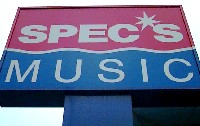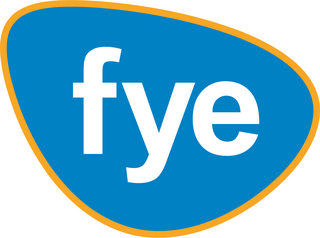Pueblo is a Puerto Rican supermarkets chain. It has been one of Puerto Rico's major supermarket chains since 1955.

Blockbuster Video is an American video rental store chain. It was founded by David Cook in 1985 as a stand-alone mom-and-pop home video rental shop, but later grew into a national store chain featuring video game rentals, DVD-by-mail, streaming, video on demand, and cinema theater. The company expanded internationally throughout the 1990s. At its peak in 2004, Blockbuster consisted of 9,094 stores and employed approximately 84,300 people: 58,500 in the United States and 25,800 in other countries.

Best Buy Co. Inc. is an American multinational consumer electronics retailer headquartered in Richfield, Minnesota. Originally founded by Richard M. Schulze and James Wheeler in 1966 as an audio specialty store called Sound of Music, it was rebranded under its current name with an emphasis on consumer electronics in 1983.
S. H. Kress & Co. was the trading name of a chain of five and dime retail department stores in the United States established by Samuel Henry Kress. It operated from 1896 to 1981. In the first half of the 20th century, there were Kress stores with ornamented architecture in hundreds of cities and towns.
Tower Records is an international retail franchise and online music store that was formerly based in Sacramento, California, United States. From 1960 until 2006, Tower operated retail stores in the United States, which closed when Tower Records filed for bankruptcy and liquidation. Tower Records was purchased by a separate entity and was not affected by the retail store closings.

Suncoast Motion Picture Company is an American chain of retail stores specializing in new and used physical media, primarily CDs, DVDs, Blu-rays, and vinyl records, as well as collectibles.
Kaspien Holdings, Inc. is an American company that provides software and services for ecommerce. Kaspien Holdings operates on Amazon in the United States, Canada, United Kingdom, Spain, France, Italy, Germany, the Netherlands, Sweden, and India, as well as Walmart Marketplace, eBay, Google Shopping, and Target. Its interim CEO is Goldman Sachs veteran Brock Kowalchuk, who took over March 11, 2022.

Media Play was a chain of retail stores founded in 1992 by Musicland that sold VHS, DVDs, music, electronics, toys, video games, anime, books, and board games similar to Hastings Entertainment, 2nd and Charles, and Half Price Books. Each store contained full book, movie, music, and video game sections under one roof. At their height, they operated 72 stores in 19 states with 2,000 employees. The first store opened in Rockford, Illinois, in 1992. Hundreds of stores were slated to be opened, but only 89 ever were. Media Play opened stores from 1992 to 2000.

Family Video Movie Club Inc. was an American brick and mortar video rental chain serving the United States and Canada. The family-owned company is headquartered in Glenview, Illinois.
Sam Goody is a music and entertainment retailer in the United States and United Kingdom, operated by The Musicland Group, Inc. It was purchased by Best Buy in 2000, sold to Sun Capital Partners in 2003, and filed for bankruptcy in 2006, closing most of its stores. The remaining stores were purchased by Trans World Entertainment, which also runs FYE, Saturday Matinee, and Suncoast Motion Picture Company.
The Musicland Group, Inc. was an entertainment company that ran Musicland, Sam Goody, Discount Records, Suncoast Motion Picture Company, On Cue, and the Media Play Superstore Chains. The Musicland Group was purchased by Best Buy in 2001 at the height of Musicland's success, which ultimately led to its demise. Jack Eugster was the CEO of The Musicland Group, from 1980, until February 2001. Its headquarters were in Minnetonka, Minnesota.
Miller & Rhoads was a Virginia-based department store chain. Throughout its 105-year lifespan, the store played an active role in the Richmond, Virginia community, along with its friendly cross-street rival Thalhimers. The Richmond flagship location was known for its "SantaLand" upstairs attraction, which has since become an attraction at the Children’s Museum of Richmond. In 1987, Campeau purchased Miller & Rhoads and later sold it to Philadelphia developer Kevin Donohoe and store management before closing in 1990.
Richardson Square Mall (1977-2006) was an enclosed single-level shopping center located in Richardson, Texas on Plano Road, stretching between the intersections of Belt Line Road and Spring Valley Road. The three adjacent corners of Belt Line and Plano Road were also occupied by shopping centers. The mall attached to an existing Sears, which served as an anchor store and remained in business after Richardson Square Mall was demolished in June 2007.

Shelter Cove Towne Centre, formerly The Mall at Shelter Cove, is a mixed-use lifestyle center located in Hilton Head Island, South Carolina. The center features two anchor stores, which include Belk and Kroger, a park, and two luxury apartment buildings.

Plaza Carolina is an enclosed shopping mall located in Carolina, Puerto Rico. Anchored by JCPenney, TJ Maxx, Caribbean Cinemas, Burlington and Forever 21, it features 161 stores, making it the second largest mall in Puerto Rico and the Caribbean. It also has a food court in its second floor and several offices in its third floor.

Spec's Music was a South Florida-based retail music and video rental chain headquartered in Miami. At its height of popularity, Spec's Music operated 80 stores, including 20,000-square-foot (1,900 m2) "superstores" in Miami Beach, West Palm Beach, and Sunrise. The company's stores were located in malls, strip centers, and free-standing locations throughout Florida. Four of the company's stores were located in malls in Puerto Rico. As of 2021, the last location closed. It was located in the Plaza Las Americas mall in Hato Rey, Puerto Rico.

2428392, Inc. is an American chain of entertainment retail stores headquartered in Albany, New York. Formerly owned by Trans World Entertainment, it began in 1993 and was expanded in 2001, 2006, and again in 2009 after buying out and rebranding mall-based stores Camelot, Sam Goody, Spec's Music, Strawberries, Record Town, Coconuts, DiscJockey, Saturday Matinee, The Wall, Suncoast Motion Picture Company, Musicland, Media Play, and His Master's Voice stores. There are 206 locations as of May 2019. As of 2023, FYE is a unit of 2428392, Inc. and retained its headquarters.
Grossmont Center is an outdoor shopping mall in La Mesa, California, a suburb in East County, San Diego. The mall opened in 1961 and is managed by Federal Realty Investment Trust. The anchor stores are Target, Macy's, RH Outlet, Walmart, Barnes & Noble, and Reading Cinemas.
Licorice Pizza was a Los Angeles record store chain that inspired the title of Paul Thomas Anderson's 2021 film of the same name. The term is a colloquial expression for vinyl records, comparing them to the color of licorice and the shape of a pizza.








